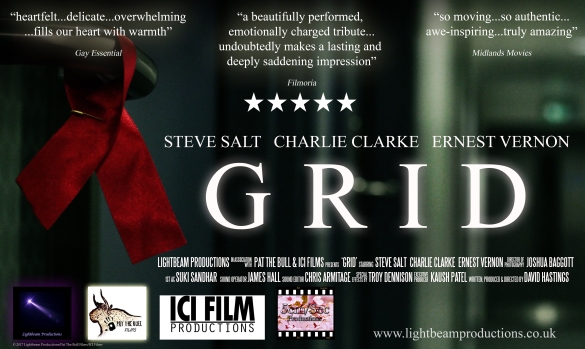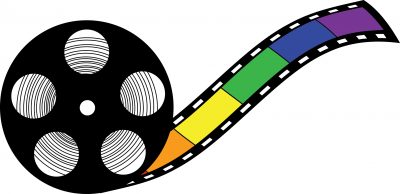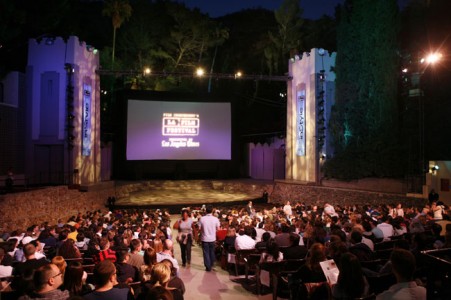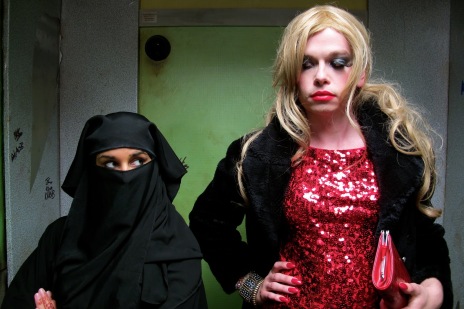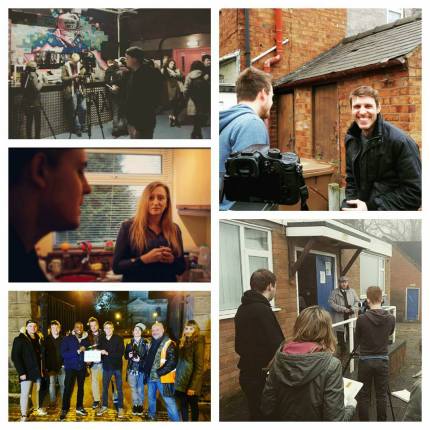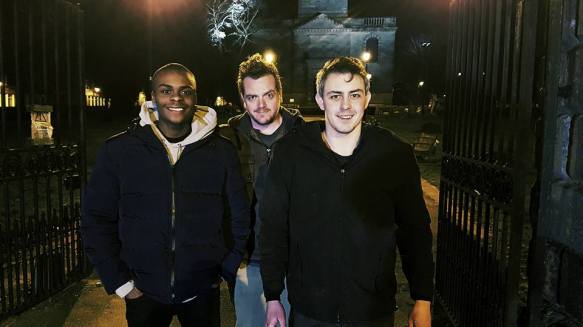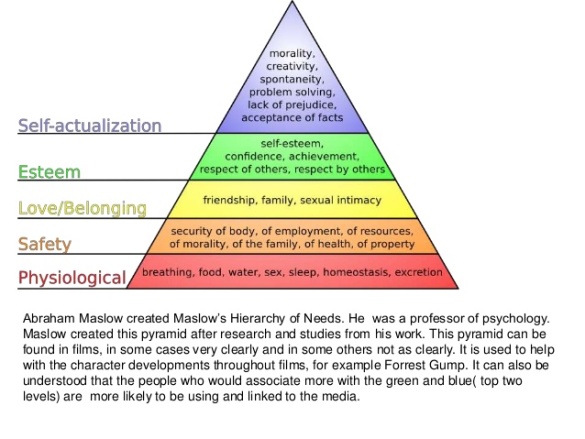This past week, I’ve been overwhelmed by the extremely positive and humbling reactions GRID has been receiving in its first initial reviews.
It was our aim, to make sure this film spoke to everyone and highlighted the plight of those in the early 80s who unfortunately we lost to the virus as well as send a message of hope and to salute those who are still fighting today.
Thank you to everyone who has reviewed the film and take it to their hearts so far. As writer/director, and I’m sure I speak for the rest of this wonderful cast/crew, your kind words mean the world to us all.
MIDLANDS MOVIES – Kira Comerford
Set in the mid 1980s, the virus that would eventually be known worldwide as AIDS, has already struck fear into the medical profession as well as the LGBTQ community.
As large numbers of this populace are being unmercifully struck down by this horrid and mysterious/insidious killer virus, in one hospital there remains hope. As Angie Wordsworth (Charlie Clarke), a cover nurse, meets Daniel Cole (Steven Salt), a patient who has been cruelly afflicted with the virus and who has had no-one but Doctor Andrews (Ernest Vernon), to care for him, having being abandoned and left with nothing but his ever diminishing memories.
As Angie and Daniel, two complete strangers, comprehend their situation together, a bond is lovingly formed between patient and carer, no matter what the consequences and without prejudice. A bond that will prove, that in our darkest moments, humanity & love, will always find a way to shine through.
After spending some time working on feature film, The House Of Screaming Death, Midlands writer and director Dave Hastings has decided to turn his focus back to short films. GRID is a project that is pure drama and one that is also very close to his heart – something that I think shows in what is a very moving watch. Hastings has stated that this was perhaps one the most difficult films for him to make due to his personal connections to it, but also because he had to make sure that a film with AIDS as it’s subject matter dealt with the issue in a sensitive manner. It was a privilege to be able to see the film recently, and I think it’s only fair that I share some of my thoughts with you.
The performances are what make this film so moving in my opinion. Steve Salt’s appearance as Daniel Cole was his second collaboration with Hastings, and while I haven’t seen their first project, I can only assume that this pair bring out the best in each other when they work together. Hastings created a beautiful character in Daniel, and Salt brought him to life in a way that was perfectly in line with the tone of the film. What initially caught Salt’s attention was the weight of the script and the themes that could be drawn out of it, and I think that it is these aspects that make the performance feel so authentic.
Charlie Clarke’s role as Angie Wordsworth was reminiscent of Elisabeth Shue’s performance as Sera in Leaving Las Vegas for me. She has said that she felt a huge responsibility taking on the role, and she carried that responsibility very well if you ask me.
Alongside those awe-inspiring performances, however, I also loved the fact that the film paid homage to two groups of people – those who had battled, or are battling, the disease, and those who worked with sufferers, especially at a time when there was very little understanding about it all. It worked well in showing both sides of the fight against AIDS and added another layer to the film in a way as it showed that it wasn’t just sufferers of the disease whose lives were affected by it.
On the whole, GRID is a truly amazing short film that deals with a difficult issue in the most tasteful of ways. It was a pleasure to watch the film and I wish all the people involved the best of luck as it is due to be circulated to a number of film festivals over the coming weeks.
GAY ESSENTIAL – Francesco Cerniglia
In the ‘About’ section of his production company’s website, filmmaker David Hastings wrote that “he loves making films for the simple joy of it rather than the red carpets or the showbiz glitter and that he’s passionate about creating and developing films that can bring people together and allow them to appreciate the world through a lens.” It’d be too easy to dismiss the idealism of an emerging talent with cynicism but upon watching Grid – his latest, heartfelt, short film – and after chatting with him on Skype, it’s evident how this promising, young British filmmaker actually embodies his mission statement.
Based in the Midlands, just off of Birmingham, Hastings studied Film Theory and Production at Manchester Met University, although he immersed himself into filmmaking from an early age. He grew up with horror films, which hugely affected his imagination, especially the Hammer ones, but he has developed a versatile taste in all sorts of storytelling: “I love horror films – they are a guilty pleasure to me – but I do love dramas as well. I grew up with films like ‘The Remains of the Day’ and I’m kind of a sucker for a good love story too, so I want to do as much diverse stuff as possible because it widens your scope as a filmmaker and shows what you can do.”
In 2007 the young filmmaker formed Lightbeam Productions and has been writing, directing and producing numerous projects within a wide range of genres ever since – his short Halloween Night Terror won best film at the Phoenix ComicCon Film Festival. In 2014 he worked on his first feature, Checking In, an anthology film he did with some filmmaker friends, which includes 5 stories set in a hotel over 24 hours, each one directed by a different filmmaker. It was Hastings’ first proper foray into LGBT characters as his story – the last one in the film – dealt with a guy who would indulge in gay one-night-stands whenever he’d go away for work, leaving his girlfriend behind.
Grid is a delicate piece of filmmaking set in the mid 80s during the AIDS crisis, back when doctors were still trying to figure out what the horrible virus was all about. Yet the stigma plaguing gay men as much as the disease itself had already started to get them ostracized by society. Albeit fictional, the short film is inspired by true stories that Hastings researched thoroughly: “I usually do a lot of research when I write my scripts and I certainly wanted to do justice to such a delicate subject and telling an intimate story within that period. I read a lot about the virus itself and what it does to people, which was horrific and upsetting to read and to see pictures of people whose lives were devastated by this dreadful illness, yet I wanted to make sure that my characters was portrayed authentically on screen.”
Hastings likes to find little known stories and being a gay man himself and a British filmmaker, he’s always been interested in the AIDS crisis and the fact it hasn’t really been addressed that often in British cinema: “Despite being a horrendous time, there are actually so many amazing stories that are full of hope and love, showing how people came together. The fact that many of these little stories had never seen the light of day really intrigued me and that’s why I thought it was a good idea to pursue for this short. I guess the British perspective was something else that interested me since we haven’t seen it represented so much over here and also trying to find something new to say about it and portray the time when the lack of information made it even more terrifying. I guess the first big newsworthy case in our country was Freddie Mercury and even then of course the press wasn’t being kind about it with AIDS having become a stigma and some sort of righteous punishment for homosexuality. I remember this advert about the illness in the 80s, which had a gravestone and a voiceover and was terrifying for 8 years old me. So I thought it was important to tell a story that would highlight how in such a difficult time there was still hope and love and solidarity out there.”
In Grid, the filmmaker follows a young female nurse (Charlie Clarke), who is assigned a night shift to care for a special patient whose peculiar condition has scared off her coworkers. Whilst getting debriefed on the case by the kind-hearted doctor (Ernest Vernon), who has the young man under his care, it becomes promptly clear to the viewer what mysterious virus the clueless doctor is talking about. It’s actually eerie to imagine what it must’ve felt like back in the day, when the merciless disease broke out, leaving everyone baffled about its nature. Our nurse though doesn’t seem the kind of person to get easily intimidated and if anything, her overwhelming empathy and altruistic spirit fills our heart with warmth as we see her tend to the ostracised patient (Steve Salt).
There’s no denying the filmmaker has achieved his goal – Grid showcases his great sensibility at tackling such a challenging topic that despite the progress medicine has made, still is an open wound in the gay community and mankind in general. Speaking of how gay-themed cinema may eventually become an integral part of our cultural fabric, Hastings notes that it’s no easy task: “A film like ‘Brokeback Mountain’ was fantastic and definitely opened the doors for LGBT issues to get more visibility but unfortunately, after the hype of the moment, I feel it all died down a bit and it went back to being alternative cinema.”
Meanwhile, speaking about what’s next on his slate, the filmmaker is currently in post-production on another anthology film, although a horror one this time, called The House Of Screaming Death, which is an homage to Hammer horror films and hopefully it should be out in the next few months. But he is also shooting another feature film at the moment, called Sustain and it’s about the repercussions of a crime when one of two brothers is murdered in a racial attack: “It’s a pretty diverse filmography because I don’t necessarily like sticking to one genre although you could say I’m intrigued by those kinds of stories about an event that disrupts a community or certain lives within that community and the repercussions of that and how people respond to such events. It was the same with ‘Grid’ in that respect as we see the repercussion of the virus and how people cope with it but since we tend to always hear the negative stories or stories about celebrities, I thought I’d rather focus on stories of hope and about everyday people with no resources.”
Given his passion, dedication and work ethic we have no doubt that David Hastings will keep making movies one way or another and we can only wish to hear his name alongside some major British talent as well.
FILMORIA – Darryl Griffiths
Gay Related Immune Deficiency: the original name of the vicious virus we now know as HIV and AIDS. At the height of the epidemic back in the 1980’s, as the health of many spirited young men deteriorated, so did the moral fibre of others with the perception of the gay community mired in malice. Even in the year 2017, the stigma firmly attached, and the lack of education staggering. A deeply disheartening consistency of rendering the feelings of those who are positive redundant, when we never fully know the real circumstances behind them contracting the disease, as they simply want comfort and understanding.
A personal passion project for West Midlands-based director Dave Hastings, Grid is a beautifully performed, emotionally charged tribute to those still fighting and to those we’ve sadly lost. Mirroring the heartbreaking isolation suffered by Steve Salt’s ill protagonist with all around him unnerved by a red ribbon tied to his patient room door, the film harnesses its focus on the sympathetic efforts of Ernest Vernon’s Doctor Andrews and Charlie Clarke’s nurse Angie Wordsworth.
Long into the night, the strain etched across Andrews’ face speaks volumes, as he finds the sense of failure difficult to shake. Like his fellow medical specialists who are scrambling for definitive answers to the cause, he finds no comfort in the rhetoric that the condition is ‘the gay plague’ or ‘God’s way of cruel punishment’, reinforcing his desire to help regardless of age, gender or circumstance. Resuming a role which her fellow nurses have been reluctant to undertake, Angie’s calming and caring influence is merely solidified as she sits at the bed side of Daniel (Salt), creating a tender dynamic and juxtaposition through their philosophical and grounded outlooks.
The power of Grid is truly defined through its visual palette and the subtlety of its direction. The desaturated and muted opening frames that compliment the varying fears and anxieties these characters exude, shifting into the deep melancholic blues of its poignant late stages, becoming transfixed by Daniel’s story. Intertwined with the slight, considered delivery of its dialogue, the film never feels intrusive or gratuitous, as director Hastings impeccably observes over the enveloping beauty of his cast.
Gracefully allowing his co-stars to take centre stage, Ernest Vernon’s turn as Doctor Andrews undoubtedly makes a lasting and deeply saddening impression, almost dumbfounded by the desperate fact he is unable to make a significant difference to Daniel’s well being.
A performance that brims with authenticity and stifling intimacy, Steve Salt is outstanding in conveying the simmering pain inflicted by those who’ve abandoned him, along with a soulful, sweet nature through the delicacy of his figure movements. Never feeling burdened or weighed down by her duties, the sheer sensitivity instilled into the role of Angie by Charlie Clarke is superb, with her closing moments reading the contents of a particular letter truly overwhelming.
In poignantly touching on a topic that undoubtedly still needs better representation in the modern climate, whilst acknowledging the horror and fear of the unknown that broke many hearts three decades ago. Grid is remarkable proof that even in one’s darkest hour, love and care does indeed trump hate and prejudice. Simply stunning.
